St Joseph's Industrial School for Roman Catholic Boys, Limerick / Glin, Co. Limerick, Republic of Ireland
St Joseph's Industrial School for Roman Catholic Boys was established in Limerick in 1875. The sum of £5,100 was expended on the erection of the buildings on Sexton Street, Limerick, which were said to be lofty and well planned, They consisted of a kitchen, refectory, water-closets, bathroom, lavatories, dormitories, classroom, workshops, and apartments for the staff. The building was supplied with gas and a mains water supply. The premises were officially certified for operation on 18 August 1875 with accommodation for 100 boys.
The new School was run by the Congregation of Christian Brothers and managed by the Rev. Brother P.A. Martin and a staff of Brothers. They were assisted by a farm labourer and military pensioner. The latter organized a brass and reed band for the School. The industrial training included carpentry, baking, tailoring, shoemaking, the use of the sewing machine, and knitting. The boys also did the housework, washed, and worked in the garden. By 1876, some boys were being trained to be clerks in mercantile houses.
In 1877, a 35-acre farm was purchased in the neighbourhood of Limerick, within a ten-minute drive from the School. It was well stocked with milk cows and young cattle, and was worked by the boys, by whom the cows were also milked. A forge and cartwright's workshop had been added to the premises. Industrial training now included baking, painting and glazing, while drawing and singing had been added to the classroom curriculum. A string band had been formed. A system of rewards for good conduct had been instituted.
On August 18 1875, the St Joseph's Industrial School for Roman Catholic Boys, an Industrial School for Boys was certified to operate in premises at Sexton Street, Limerick, Co. Limerick. for Roman Catholic The premises could accommodate up to 170 boys , aged 6-16 at their date of admission.
At beginning of 1880, Bother Martin resigned as manager as was succeeded by Brother M.F. Mulligan. In February of the same year, the capacity of the School was increased to 150 places. Temporary extra accommodation was provided in a wooden building, 106 feet by 24, housing an infirmary, dormitory and workshop. At the same time, plans were approved for a new permanent building, housing a boys' refectory, with school and dormitory overhead, and a detached infirmary.
In 1884, Brother P.C. Flood became manager. He was assisted by a staff of seven Christian Brothers, with paid assistants, and ten trades' instructors. Classroom subjects now comprised reading, writing, arithmetic, dictation, grammar, geography, book-keeping, mensuration, and commercial correspondence. Industrial training included baking, carpentry, cartmaking, tailoring, shoemaking, painting,coach-building,smith's-work, farming, and gardening, including the management of horses, cows, and pigs.
In 1885, Brother Flood was appointed manager of a new Industrial at Letterfrack.
The School site in the early 1900s is shown on the map below.
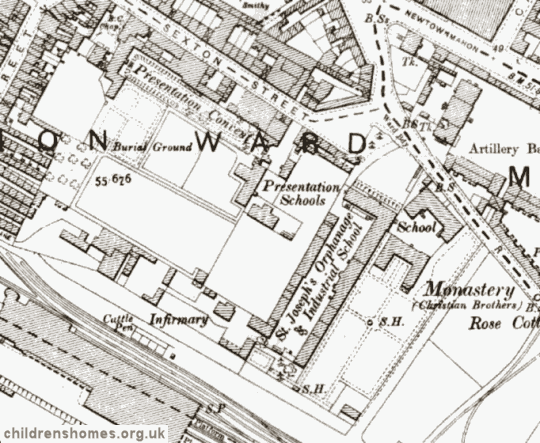
St Joseph's Industrial School for Roman Catholic Boys site, Limerick, early 1900s.
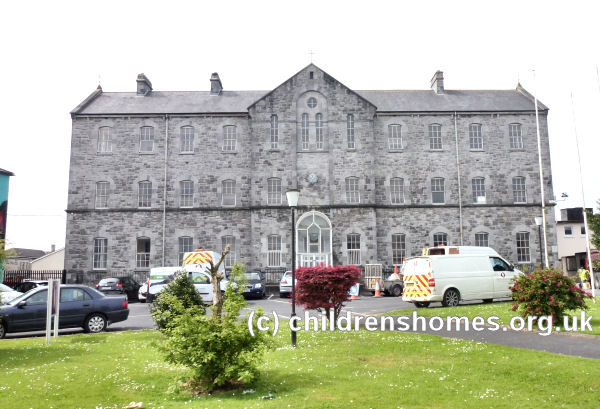
Former St Joseph's Industrial School for Roman Catholic Boys, Limerick, from the north, 2014. © Peter Higginbotham
On 27 April 1897, the official capacity of the School was increased to 170 places.
On 1928, St Joseph's moved from its overcrowded building at Sexton Street to the former Poor Law District School at Glin, Co. Limerick. The premises were originally constructed as the Glin Union workhouse then, from 1893 to 1926, had housed children from workhouses in Co. Limerick and north Kerry. Around £15,000 was spent on renovating and improving the buildings for use by St Joseph's, including the installation of a new hot water heating system, dining hall, infirmary, chapel, new floors in the dormitories, new windows and doors, new steam presses and new cookers. Although retaining the St Joseph's name, the establishment was often then also referred to as Glin Industrial School.
The District School site is shown on the early 1900s map below.
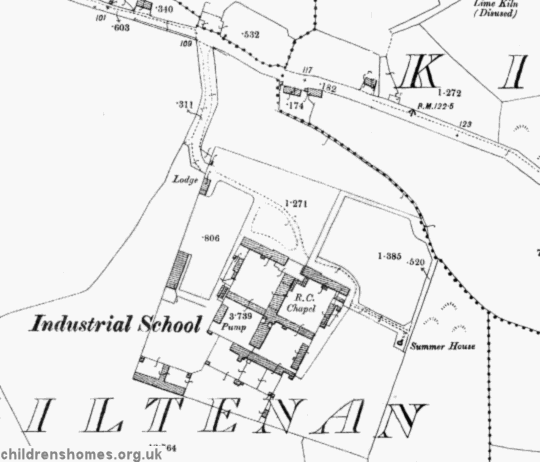
District School site, Glin, early 1900s.
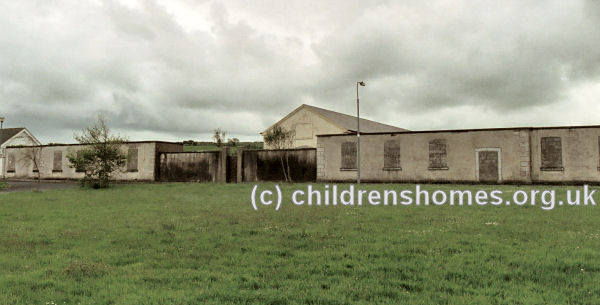
Former St Joseph's Industrial School from the north, Glin, 2002. © Peter Higginbotham
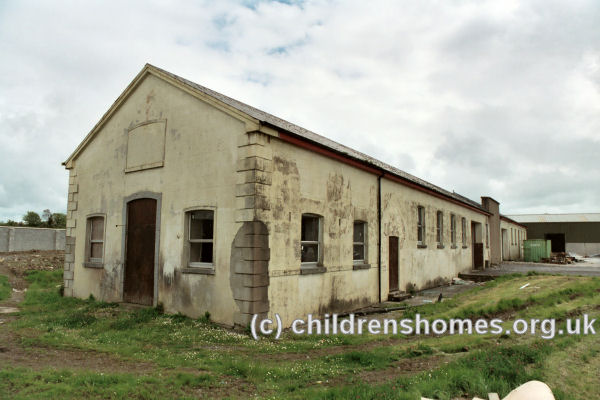
Former St Joseph's Industrial School from the north, Glin, 2002. © Peter Higginbotham
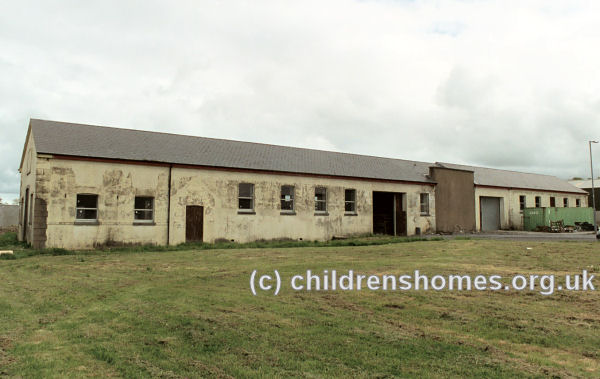
Former St Joseph's Industrial School from the north, Glin, 2002. © Peter Higginbotham
The School closed in 1966. The buildings no longer exist and the site is now occupied by commercial premises.
St Joseph's was one of the institutions investigated by Ireland's Commission to Inquire into Child Abuse, launched in 1999. After reviewing extensive evidence and the testimonies of former inmates, the Commission concluded that over a period from the 1920s to 1966:
- The School was run under a severe, systemic regime of corporal punishment.
- The Congregation transferred two Brothers to Glin, despite evidence or suspicion of their having sexually abusing boys in other Christian Brothers' institutions. This decision protected both Congregation the and the Brothers but endangered the boys at Glin.
- There were serious deficiencies in the physical care, facilities, accommodation, education, training and aftercare at the School.
- Problems affecting the standard of care in Glin persisted, despite being reported by both the Congregation's Visitor and the Department of Education Inspectors.
- The Department of Education failed in its supervisory duties. Its role was protective of the institution and its response to serious complaints was cursory and dismissive.
Records
Note: many repositories impose a closure period of up to 100 years for records identifying individuals. Before travelling a long distance, always check that the records you want to consult will be available.
- Christian Brothers Province Centre, Griffith Avenue, Marino, Dublin 9. Email: archives@edmundrice.eu.
Bibliography
- Arnold, Mavis, and Laskey, Heather Children of the Poor Clares (2004, Appletree Press)
- Barnes, Jane Irish Industrial Schools 1868-1908 (1989, Irish Academic Press)
- Dunne, Joe The Stolen Child: A Memoir (2003, Marion Books)
- Rafferty, Mary and O'Sullivan, Eoin Suffer the Little Children: The Inside Story of Ireland's Industrial Schools (1999, New Island Books)
- Touher, Patrick Fear of the Collar: Artane Industrial School — My Extraordinary Childhood (1991, O'Brien Press)
- Tyrrell, Peter and Whelan, Diarmuid Founded on Fear: Letterfrack Industrial School (2006, Irish Academic Press)
- Wall, Tom The Boy from Glin Industrial School (2015, Tom Wall)
- Higginbotham, Peter Children's Homes: A History of Institutional Care for Britain's Young (2017, Pen & Sword)
- Mahood, Linda Policing Gender, Class and Family: Britain, 1850-1940 (1995, Univeristy of Alberta Press)
- Prahms, Wendy Newcastle Ragged and Industrial School (2006, The History Press)
Links
- Glencree Reconciliation Centre (former Reformatory site)
- The Commission to Inquire into Child Abuse
- The Commission to Inquire into Child Abuse
Except where indicated, this page () © Peter Higginbotham. Contents may not be reproduced without permission.


